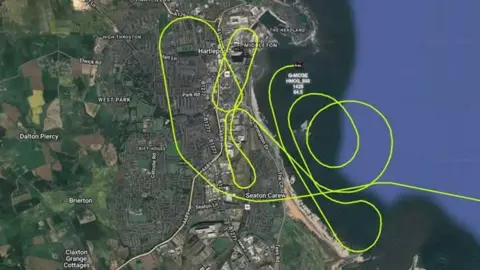Beacon sparking search found at recycling plant
 RNLI
RNLIA search and rescue operation involving a coastguard helicopter and the RNLI ended on land when an emergency beacon was found at a recycling centre.
The emergency signal was picked up in Hartlepool by the coastguard shortly after 10:00 BST, sparking a search of the River Tees and the nearby coast.
But after 45 minutes the beacon, which is usually used on boats or life jackets, was found travelling along a conveyor belt at the J&B recycling plant.
RNLI lifeboat operations manager Steve Pounder said: "How it had got to a recycling centre, I really don't know."
Mr Pounder said emergency position indicating radio beacons (RPIRB) were fairly common and used by merchant vessels and fishermen.
"They can be quite easily activated, so we don't think there was anything malicious about it," he said.
"It could have been thrown away because it's gone past its life cycle. Or it could have ended up with refuge off a ship and it's been thrown away by accident."
Proper disposal
Mr Pounder said beacons were sometimes activated by accident as they did not make a noise when they went off.
He said the RNLI treated every case as an emergency but the false alarm was "just one of those things".
However, as soon as the crew returned to the boat station it was called to a real emergency when a yacht broke down near Staithes.
Mr Pounder warned people to be careful when handling their beacons and said they should be properly disposed of at a ship chandler, a shipping equipment retailer.
J&B Recycling's managing director Vikki Jackson-Smith said the discovery of the emergency beacon topped the list of unusual items found at the centre.
"Items like this should never end up in household recycling," she said.
"Not only can they cause disruption, but they pose a risk to safety and can lead to unnecessary emergency call-outs."
